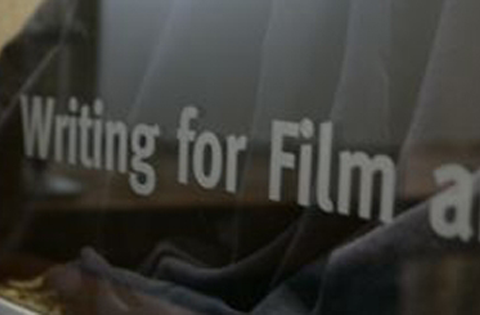| |
Nov 27, 2024
|
|
|
|
|
2013-2014 University Catalog [Archived Catalogue]
Writing for Film and Television, Bachelor of Fine Arts
|
|
Programs > Programs in the College of Art, Media, and Design
Contacts Mission Description Program Objectives Program Requirements

Quick Links
College of Art, Media & Design
School of Film
Liberal Arts Distribution
Contacts
Diane Walsh \ dwalsh@uarts.edu \ 215.717.6560
Program Director
Mission
The Writing for Film and Television program is committed to educating students in the craft technique of screen and television script writing. It emphasizes an applied approach to the writing courses along with an appreciation of the history and criticism of both media. Upon completing the program, students are prepared to engage in scriptwriting professionally or to pursue advanced study in creative writing.
Description
Writing for Film and Television is an undergraduate program that teaches future screenwriters, filmmakers, story-development executives, and producers the art of writing narrative scripts for the screen. Students write feature-length screenplays and hour-long teleplays, gain a sophisticated knowledge of story development, and create, write, and produce episodic drama series for the Web. The core of the experience is writing and revising in a workshop environment with close guidance and support from industry-experienced faculty.
Program Objectives
Students graduating with a Bachelor of Fine Arts in Writing for Film and Television will:
- learn dramatic-structure techniques and apply them to their original written work;
- solve story problems creatively and through experimentation;
- gain expertise in critical analysis;
- develop a more sophisticated and evocative use of language;
- demonstrate professional scriptwriting practices;
- generate or find story ideas to develop for movies, television or Web series;
- learn to work with production crews and to participate in the filming of student scripts;
- recognize historical and cultural influences on film, television, and the Web in their own writing.
Program Requirements (120 credits)
|
CAMD College Core (12 credits)
Image/Time
- Select 1 course from subjects: IMAG or TIME
Object/Environment
- Select 1 course from subjects: OBJT or ENVI
CAMD School Core (6 credits)
All CAMD students are required to complete 6 credits of School Core coursework during their first three semesters. Students are free to select courses from any school or cross-college program. Refer to the CAMD School Core page for additional information. Illustration (Cross-College Program)
Major Requirements (33 credits)
Required Sequence
Complete 1 of the following sequences:
Discipline History (9 credits)
Liberal Arts Distribution (33 credits)
First Year Writing (6 credits)
- or 3 credits
- or 3 credits
Humanities Seminar (3 credits)
- Select 1 course from subject HUMS
Period Interpretation (6 credits)
- Select 1 course from subject LAPI, level 800 (Select 1 course from subject PIPT)
- Select 1 course from subject LAPI, level 900 (Select 1 course from subject PITC)
Scientific Inquiry Foundation Track (3 credits)
- Select 1 course from subject LACR, level 200 (excluding LACR 210) (Select 1 course from subject SIFT)
Liberal Arts Electives (15 credits)
- Select courses from subjects: LAAH, LALL, LAPR, LASM, or LASS
- Select courses from subjects:
- AHST (Art History), HIST (History)
- ARAB (Arabic), FRCH (French), ITAL (Italian), LITT (Literature)
- PHIL (Philosophy), RELI (Religion)
- MATH (Math), SCIE (Science)
- ANTH (Anthropology), PHIL (Philosophy), PSYC (Psychology), SOCI (Sociology)
- STCU (Cultural Studies), STDA (Dance Studies), STGS (Gender & Sexuality Studies),
STMU (Music Studies), STPF (Performance Studies)
- Select courses from : Art History or LA Elective.
Electives (16.5 credits)
- Complete 16.5 credits of free electives. This requirement is satisfied by any undergraduate course that isn’t required by the program.
|
|
|